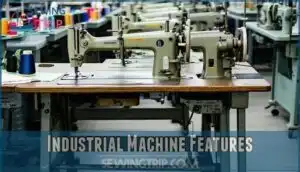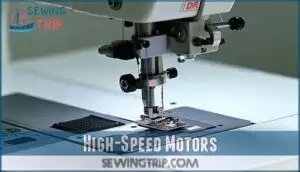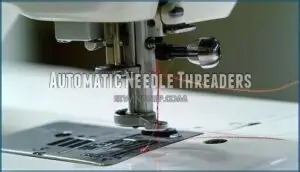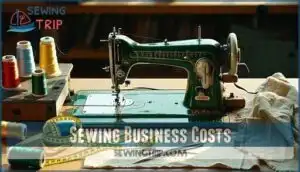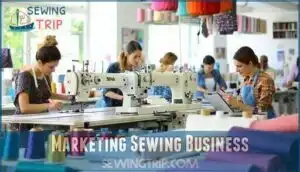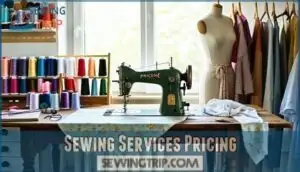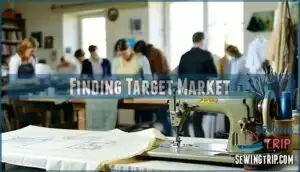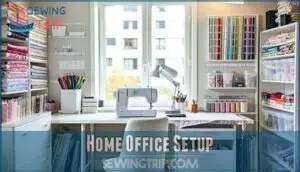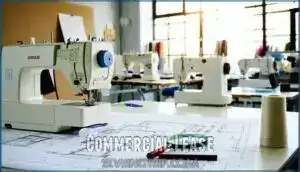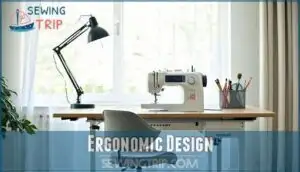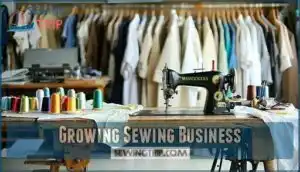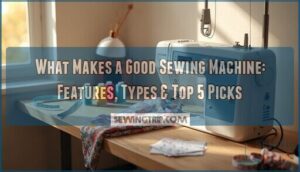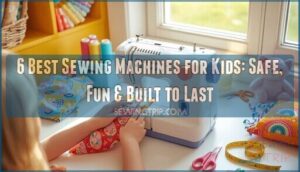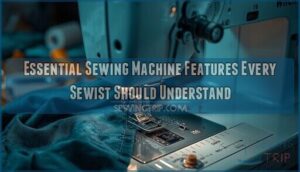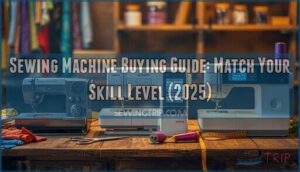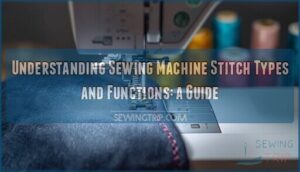This site is supported by our readers. We may earn a commission, at no cost to you, if you purchase through links.
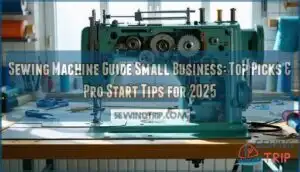
You’ll need equipment that can handle your specific workload without breaking the bank or your back. Industrial machines offer durability for high-volume work, while computerized models provide versatility for custom projects.
Consider your niche first—alterations need different capabilities than embroidery or upholstery work. Think about stitch quality, speed, and maintenance costs.
Your machine becomes your business partner, so invest wisely in reliability over flashy features. The difference between hobbyist and professional equipment can make or break your venture’s success and profitability from day one.
Table Of Contents
- Key Takeaways
- Starting Sewing Business
- Choosing Right Machine
- Top 10 Sewing Machines
- 1. SINGER Quantum Stylist Sewing Quilting Machine
- 2. Brother PQ1500SL High Speed Quilting Machine
- 3. SINGER Heavy Duty Sewing Machine
- 4. Brother SE1900 Sewing and Embroidery Machine
- 5. Janome MC6650 Sewing Quilting Machine
- 6. Heureux Computerized Sewing and Quilting Machine
- 7. Juki Heavy Duty Sewing Machine
- 8. Reliable Barracuda Zig Zag Sewing Machine
- 9. Singer Heavy Duty 4452 Machine
- 10. VEVOR Industrial Upholstery Sewing Machine
- Sewing Business Costs
- Marketing Sewing Business
- Sewing Services Pricing
- Finding Target Market
- Setting Up Workspace
- Growing Sewing Business
- Frequently Asked Questions (FAQs)
- Conclusion
Key Takeaways
- Match your machine to your niche – You’ll need different capabilities for alterations versus embroidery or upholstery work, so don’t buy based on features you won’t use
- Prioritize reliability over flashy features – Your machine becomes your business partner, so invest in durability and consistent performance rather than bells and whistles that might break down
- Budget realistically for startup costs – You’ll need $3,000-$11,365 to get started, with quality machines and supplies taking the biggest chunk of your investment
- Focus on industrial-grade performance for serious volume – If you’re handling continuous operation or thick materials, industrial machines with servo motors and heavy-duty construction will pay for themselves through increased productivity
Starting Sewing Business
You can start your sewing business by picking a clear focus and laying out a simple plan that covers your goals and costs.
It’s important to choose the right structure, like an LLC, so you’ll be set up for growth and ready for paperwork down the road, which will help you achieve your goals.
Niche Selection
Before you start stitching up a business, finding your niche is key.
Will you shine in Custom Clothing, Bridal Wear, Alterations, or maybe Home Décor?
Or teach Sewing Classes?
Niche specialization sets you apart.
Know your target market.
Do some market research and competitive analysis, so you’re not just another needle in the haystack—be the thread that stands out.
Business Planning
Your sewing business plan serves as your roadmap to success, outlining everything from defining goals to operational logistics.
You’ll need thorough financial projections that cover startup costs and pricing strategies, plus detailed market focus analysis.
A solid business plan helps you understand sewing business costs upfront and creates a framework for sustainable growth in your chosen niche.
Teaching sewing classes, for example, requires engaging with students and evaluating skill levels, which is a key part of your business plan and contributes to overall success.
Legal Structures
Your business structure shapes everything from taxes to liability protection.
Sole proprietorship offers simplicity but zero liability shield, while partnership agreements split responsibilities and risks.
LLC benefits include liability protection and tax flexibility, making it the sweet spot for most sewing businesses.
Corporate structures provide maximum protection but require more paperwork and formalities.
Choosing Right Machine
Your sewing machine choice directly impacts your business’s productivity and the quality of your finished products.
The right machine is your business’s heartbeat—choose wisely for lasting success.
The right machine combines speed, durability, and features that match your specific services, whether you’re focusing on alterations, custom garments, or heavy-duty upholstery work, which affects the overall quality.
Industrial Machine Features
Looking beyond basic home machines, you’ll find industrial sewing machine types like lockstitch machines, overlock, and coverstitch models that transform your business capabilities.
These powerhouses feature heavy-duty build construction with cast-iron components that handle continuous operation.
Their motor power delivers stitch consistency even on challenging materials, while superior fabric handling manages everything from delicate silks to thick leather.
Though maintenance needs are higher, industrial sewing machine benefits include unmatched durability and professional results.
These machines are built with high-quality materials for demanding use.
High-Speed Motors
Why settle for sluggish stitching when high-speed motors can transform your sewing machine business? These powerhouses deliver exceptional motor torque and precise speed control, making them essential for industrial applications and small sewing business success.
One advantage of using brushless motors is their ability to support needle position control.
Key benefits for your industrial sewing machine:
- Energy Efficiency – Servo motors consume 60-80% less power than traditional clutch motors
- Superior Performance – Achieve 4,000-6,000 RPM with instant torque delivery
- Reduced Motor Maintenance – Brushless designs offer longer lifespans with fewer wearing parts
Automatic Needle Threaders
Threading headaches vanish when your sewing machine features automatic needle threaders.
Say goodbye to squinting and fumbling—automatic threading transforms your workflow instantly.
These time-saving devices eliminate squinting and fumbling, especially during high-speed sewing sessions.
Threading benefits include reduced eye strain and faster workflow shifts.
Consider threader durability and compatibility with different needle sizes before purchasing.
Some models, like the Singer 9960, even offer speeds up to 850 stitches per minute.
Regular threader maintenance guarantees consistent performance, though manual threading remains a reliable alternative when technology fails.
Top 10 Sewing Machines
You’ll need the right sewing machine to handle your business workload and deliver professional results to customers.
These top 10 machines offer the speed, durability, and features that successful sewing entrepreneurs rely on daily.
1. SINGER Quantum Stylist Sewing Quilting Machine
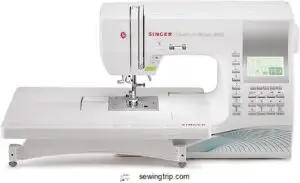
Versatility meets reliability in this powerhouse machine.
The SINGER Quantum Stylist delivers 600 built-in stitches and sews at 850 stitches per minute, making it perfect for your growing business.
You’ll love the automatic needle threader and thread cutter that save precious time on large orders.
Its sturdy metal frame handles everything from silk to denim with ease, and the included extension table and 13 presser feet give you professional capabilities right out of the box.
Best For: Growing small businesses, avid quilters, and experienced sewists who need versatility and speed for diverse projects.
- 600 built-in stitches and 13 presser feet offer expansive creative options for any sewing or quilting project.
- Automatic needle threader, thread cutter, and high-speed sewing boost efficiency, especially on large orders.
- Sturdy frame and extension table handle heavy fabrics and big quilts with professional results.
- Complex features and controls may overwhelm beginners and casual users.
- Achieving precision for expert quilting (e.g., scant quarter-inch seams) may require extra calibration or upgrades.
- At 25 lbs, portability is limited for those needing a lightweight machine for events or workshops.
2. Brother PQ1500SL High Speed Quilting Machine
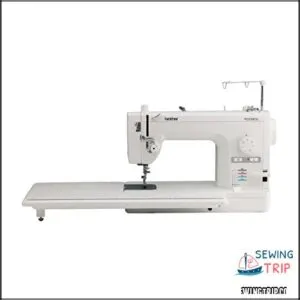
The Brother PQ1500SL delivers 1,500 stitches per minute, making it a speed demon for busy sewing businesses.
You’ll appreciate the automatic needle threader and jam-resistant bobbin system that keep your workflow smooth.
The precision pin feeding system handles everything from delicate silks to thick denim without fabric slippage.
At 29 pounds, this metal-framed workhorse stays rock-steady during high-speed quilting.
The 25-year warranty backs up its reputation as a reliable business investment.
Best For: Small business owners and serious quilters who need fast, consistent stitching on large or multi-layer projects.
- Needle threader and thread cutter may require frequent rethreading or adjustment
- Heavier than standard machines, making it less portable
- Limited self-oiling access; maintenance can be more involved
- Powerful 1,500 stitches per minute speed for rapid project completion
- Handles a wide range of fabrics with precision pin feeding and stable metal frame
- Includes many accessories and a wide workspace for ease of use
3. SINGER Heavy Duty Sewing Machine
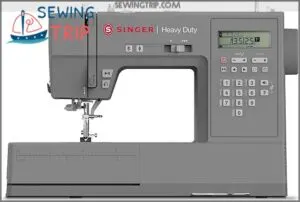
Power meets precision in this workhorse machine.
You’ll tackle thick denim, canvas, and upholstery with its 60% stronger motor and 1,100 stitches per minute speed.
The all-metal frame keeps everything steady while you power through multiple layers.
At around $200-$320, it’s perfect for small businesses needing reliable performance without industrial machine costs.
Users love its consistent stitching on heavy materials, though it can be noisy during operation.
Best For: Small business owners and advanced hobbyists who need a powerful, reliable sewing machine to handle heavy fabrics and frequent use.
- Can be noisy during extended operation.
- Sensitive foot pedal and basic needle threader may be tricky for beginners.
- Lacks some advanced features found in industrial or computerized models.
- Strong motor and metal frame easily sew through thick materials like denim and canvas.
- High speed (1,100 stitches per minute) increases productivity for bulk projects.
- Offers excellent durability and stability at an affordable price point.
4. Brother SE1900 Sewing and Embroidery Machine
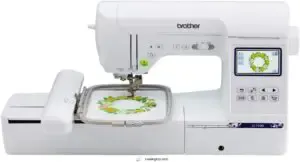
You’ll discover something special when you combine sewing and embroidery in one machine.
The Brother SE1900 delivers 240 built-in stitches and 138 embroidery designs, making it perfect for custom clothing and monogramming services.
Its 5"x7" embroidery field handles larger projects, while the 3.2" touchscreen lets you preview designs before stitching.
With automatic needle threading and USB connectivity for importing designs, you’ll spend more time creating and less time fussing with setup.
Best For: Home crafters, small business owners, and embroidery enthusiasts who want a versatile machine for sewing, quilting, and detailed embroidery projects.
- 240 built-in stitches and 138 embroidery designs for creative variety.
- 5"x7" embroidery field with clear touchscreen preview for larger, more complex projects.
- Automatic needle threading and USB import save time and simplify setup.
- Not designed for heavy-duty fabrics or industrial use.
- No included extension table for extra-large quilting projects.
- Some advanced features may require a learning curve for beginners.
5. Janome MC6650 Sewing Quilting Machine
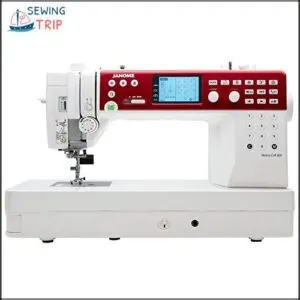
Professional quilters and business owners consistently choose this machine for good reason.
The Janome MC6650 delivers 170 stitches plus two alphabets at speeds up to 1,000 stitches per minute.
You’ll appreciate the 10-inch all-metal flatbed that handles king-sized quilts effortlessly.
The automatic thread cutter and superior needle threader save precious time on production work.
Six strategically placed LEDs guarantee perfect visibility for detailed work.
While some users report occasional technical hiccups, the heavy-duty aluminum construction typically provides years of reliable service for demanding business applications.
Best For: Professional quilters and small business owners who need a fast, durable, and versatile sewing machine for heavy-duty and detailed projects.
- Mixed user reviews regarding reliability and the need for occasional repairs.
- Customer support and repair experiences can be challenging.
- Premium features result in a higher price point.
- 170 stitches, large flatbed, and up to 1,000 SPM for high productivity on big projects.
- Automatic thread cutter, superior needle threader, and programmable controls for major time savings.
- Heavy-duty all-metal construction delivers lasting durability even with frequent use.
6. Heureux Computerized Sewing and Quilting Machine
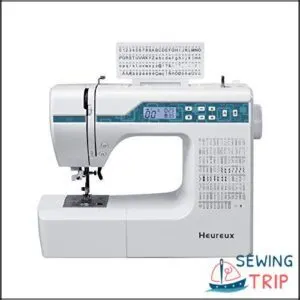
You’ll find the Heureux Computerized Sewing and Quilting Machine offers remarkable value for growing sewing businesses.
With 200 built-in stitches including decorative and alphanumeric options, it handles diverse projects from custom clothing to home décor.
The automatic needle threader and LCD screen streamline workflow, while the aluminum alloy frame guarantees durability during heavy use.
Its quiet operation lets you multitask comfortably.
The top-loading bobbin system reduces frustrating jams that can slow production.
One key feature is the drop feed capability for free-motion quilting.
At this price point, you’re getting professional features without breaking your startup budget, making it a great value for the remarkable value it offers for growing sewing businesses.
Best For: Small business owners and home sewists who want a versatile, user-friendly machine with advanced features at an affordable price.
- 200 built-in stitches and free-motion quilting support accommodate a wide range of projects.
- Quiet operation and lightweight design make it ideal for home studios and shared workspaces.
- Automatic needle threader and LCD screen simplify setup and navigation for all experience levels.
- Not designed for heavy-duty, high-volume commercial production.
- Some users report initial bobbin issues and frustration with thicker materials.
- Plastic outer frame may limit long-term robustness compared to all-metal machines.
7. Juki Heavy Duty Sewing Machine
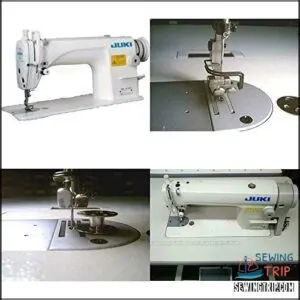
You’ll appreciate this workhorse that tackles heavy fabrics like a champion. The Juki DDL-8700H delivers industrial-grade power at 5,500 stitches per minute, making quick work of canvas, denim, and leather projects.
Its servo motor runs quietly while the robust metal construction handles continuous use without breaking a sweat.
Assembly requires patience since instructions aren’t included, but YouTube videos help guide the process.
At this price point, you’re getting professional quality that’ll serve your business for years.
Best For: Small businesses or makers who need a reliable, industrial sewing machine for heavy fabrics and high-volume projects.
- Assembly instructions not included, making setup tricky
- Occasional reports of missing or damaged parts in the box
- Workspace ruler may not be precise, requiring manual measurement adjustments
- Handles heavy materials and multiple layers easily
- Fast, quiet sewing with adjustable speed thanks to a servo motor
- Durable metal construction for long-term, low-maintenance use
8. Reliable Barracuda Zig Zag Sewing Machine
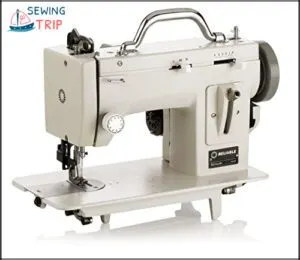
Nobody disputes that heavy-duty work demands serious equipment, and the Reliable Barracuda delivers exactly that punch.
You’ll power through 8 layers of Sunbrella-Plus fabric with its walking foot technology ensuring even stitches every time. At 800 stitches per minute, it handles canvas and webbing like a champ.
The 34-pound machine stays portable enough for mobile businesses while offering industrial-grade performance. Sure, it requires some tinkering and regular oiling, but you’re getting professional results without the $2,000 price tag.
Best For: Small business owners, hobbyists, and mobile professionals who need reliable heavy-duty sewing for canvas, upholstery, sails, and repairs.
- Powerful walking foot sews through up to 8 layers of Sunbrella-Plus or heavy canvas with even, professional results.
- Industrial-level performance in a portable 34lb machine at a more affordable price-point than most competitors.
- Straight and zig-zag stitching, with built-in speed reducer and quality control checks for versatile, consistent use.
- Needs regular oiling, tinkering, and setup adjustments for optimal performance and durability.
- Not recommended for very light fabrics or mass production; best for heavy projects and custom work.
- Mixed reliability reviews, with some users reporting mechanical issues and noisy operation.
9. Singer Heavy Duty 4452 Machine
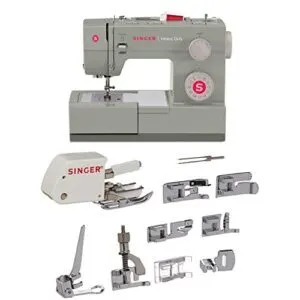
The Singer Heavy Duty 4452 delivers serious muscle for your sewing business.
This powerhouse features a 60% stronger motor than standard machines, cranking out 1,100 stitches per minute to tackle thick fabrics like denim and canvas.
You’ll get 32 built-in stitches plus automatic needle threading for efficiency.
At around $200, it’s perfect for startups needing heavy-duty performance without breaking the bank.
The metal frame guarantees years of reliable service.
Best For: Small business owners, hobbyists, and beginners who need a reliable, fast, and strong sewing machine for thick or heavy fabrics.
- Powerful motor easily handles denim, canvas, and other thick materials
- Fast sewing speed and automatic needle threader boost productivity
- Durable metal frame ensures long-term reliability
- Noisy operation and heavy weight may not suit shared or portable workspaces
- Fewer decorative stitches than advanced computerized models
- Requires manual download of the user manual, no printed copy included
10. VEVOR Industrial Upholstery Sewing Machine
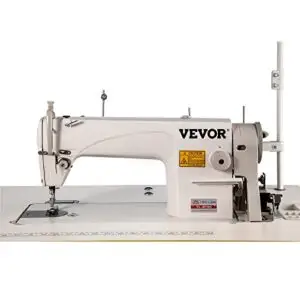
When heavy-duty projects demand serious muscle, this 550W powerhouse delivers up to 5,500 stitches per minute.
You’ll handle materials up to 5-7mm thick—think automotive upholstery, marine canvas, and leather goods with ease.
The servo motor cuts energy consumption by 60% while maintaining industrial-grade performance.
Though assembly takes patience and some users report quality control issues, its 4.7-star rating reflects solid value for small businesses tackling demanding sewing tasks.
Best For: Small businesses and serious hobbyists who need rapid, industrial-grade sewing for heavy-duty materials like upholstery, canvas, and leather.
- Assembly can be time-consuming and challenging, especially for first-time users
- Some reports of defective parts and occasional quality control issues
- Instructions may be confusing, requiring users to seek online tutorials for setup
- High-powered 550W servo motor delivers up to 5,500 stitches per minute for fast, professional results
- Handles a wide range of materials from silk to 15 layers of denim, leather, and marine canvas
- Energy-efficient and low-noise operation with advanced digital controls and clear LCD panel
Sewing Business Costs
You’ll need to budget between $3,000 and $11,365 to get your sewing business off the ground, depending on whether you’re starting small or going all-out with professional equipment.
The biggest chunk of your investment goes toward quality machines and supplies, but don’t forget about those sneaky extras like business licenses, insurance, and marketing that can add up fast.
Startup Costs
Looking at your sewing machine startup, you’ll need roughly $50,000-$150,000 for initial investment depending on your business model.
Smart budgeting software helps track these startup costs while you explore funding sources.
- Basic home setup: $5,000-$15,000 for equipment and supplies
- Commercial workspace: $50,000-$150,000 including lease deposits and renovation
- Licensing and insurance: $5,000-$15,000 for permits and coverage
- Initial inventory: $10,000-$30,000 for fabrics and notions
Cost reduction strategies like buying used equipment or starting from home can slash your financial projections substantially.
Equipment Investment
Beyond basic startup costs, your sewing machine equipment represents your biggest investment.
Industrial sewing machines and sergers require $15,000-$30,000 for quality units. Smart buyers explore Used Equipment and Rental Options to reduce upfront costs while maintaining professional capabilities.
Investing in a heavy-duty machine can substantially boost productivity.
| Investment Category | Cost Range |
|---|---|
| Industrial sewing machine | $15,000-$30,000 |
| Specialty embroidery equipment | $3,000-$10,000 |
| Ergonomic Tools & workspace setup | $2,000-$5,000 |
| Machine Maintenance & warranties | $500-$2,000 annually |
Consider Automation Upgrades for high-volume work – they’ll pay for themselves through increased productivity and reduced labor costs.
Marketing Expenses
Your marketing budget should cover content creation, promotional materials, and advertising costs across digital marketing channels and traditional marketing methods.
Start with $100-250 monthly for small operations, tracking ROI on each marketing effort.
Smart budget allocation means testing different marketing strategies to find what works best for your target audience, which involves complete concepts like understanding your audience and adjusting your strategy accordingly.
Marketing Sewing Business
You’ve got your sewing business up and running, but customers won’t find you if you’re not marketing effectively.
Smart marketing turns your skills into steady income by connecting you with the right clients through personal networks, online platforms, and local community outreach, which is crucial for steady income.
Personal Networking
Within the close-knit fabric of your community, personal connections weave the strongest marketing threads.
Join Local Guilds and attend Industry Events where fellow sewers gather. These meetups spark organic conversations about your sewing business.
Connect with mentors through Mentorship Programs who’ve navigated similar paths.
Engage in Facebook groups and Online Forums where potential clients seek recommendations. Build relationships with Sewing Influencers for authentic local collaborations that expand your reach naturally.
Digital Marketing
Digital marketing transforms your sewing business reach exponentially.
Your online store becomes your 24/7 salesperson, while strategic SEO optimization helps customers find you naturally. Smart content marketing showcases your expertise and builds trust with potential clients.
- Website SEO: Optimize for local searches like "custom alterations near me"
- Social Media: Share behind-the-scenes content and finished projects regularly
- Email Campaigns: Send newsletters featuring seasonal promotions and sewing tips
- Paid Advertising: Target specific demographics interested in custom clothing services
Traditional Marketing
Print advertising in local directories connects you with customers who still flip through phone books and community guides. Many neighborhoods treasure their monthly magazines and church bulletins.
Here’s how traditional marketing builds your sewing business:
| Method | Cost Range | Best For |
|---|---|---|
| Local Partnerships | Free-$200 | Bridal shops, fabric stores |
| Print Advertising | $50-$500 | Local newspapers, magazines |
| Direct Mail | $100-$800 | Neighborhood flyers, postcards |
| Trade Shows | $200-$1,500 | Craft fairs, community events |
Your sewing business marketing thrives when you shake hands at community events and sponsor local school programs, which can help you connect with potential customers and build a strong reputation in the community.
Sewing Services Pricing
Setting the right prices for your sewing services can make or break your business success.
You’ll need to balance material costs, labor time, and what customers are willing to pay in your local market, considering complete concepts to ensure a well-rounded approach.
Material Costs
How much should you budget for materials in your sewing business?
Fabric sourcing represents your biggest expense, typically 40-60% of project costs.
Thread types, pattern costs, and notion expenses add another 10-20%.
Smart sewing business supplies purchasing includes buying fabric in bulk, choosing quality threads that reduce breakage, and implementing waste reduction strategies.
Track all sewing machine supplies costs to price services accurately.
Labor Costs
Your sewing business’s labor costs depend on whether you hire hourly rates workers or pay piece work rates.
Skill level affects wages – experienced sewing machine operators command higher pay than entry-level sewers.
Factor in training costs for new hires and employee benefits when budgeting.
Recruitment and staffing expenses add up quickly in this competitive market.
Market Demand
Beyond just covering costs, market demand shapes what you can charge for your sewing business services.
Local trends, seasonal demand, and niche popularity drive pricing power.
Research your target demographics through online sales data and competitor analysis.
High-demand services like bridal alterations command premium rates, while basic repairs face price pressure.
Understanding market demand helps small business entrepreneurship succeed.
Finding Target Market
Understanding your target market isn’t just about demographics—it’s about discovering who genuinely needs your sewing services and will pay for quality work.
You’ll need to research local competition, identify gaps in services, and connect with potential customers through surveys, community feedback, and direct conversations to build a thriving sewing business.
Identifying Customer Needs
Once you know your pricing, you’ll need to understand what your sewing business customers actually want.
Service demand varies by location—busy professionals need quick alterations while craft enthusiasts want custom pieces.
Pay attention to style preferences and fabric choices when clients describe their vision. Ask specific questions about project specifications during consultations.
Track satisfaction metrics to see which sewing business services resonate most with your target market, and understand what drives customer demand and project specifications.
Market Research
Everyone needs data before diving into any venture.
Start by examining Market Trends in your local sewing supplies market to spot Service Demand patterns.
Study Customer Demographics through surveys and social media insights.
Research Competitor Pricing to position yourself strategically.
This market research reveals Niche Opportunities that’ll help you dominate your target market effectively.
Competition Analysis
Your sewing business guide needs solid competition analysis to succeed.
Local competition reveals pricing strategies and service gaps you can exploit. Study competitor strengths like specialized alterations or quick turnarounds.
Check if they offer embroidery, repairs, or classes. Market research shows most sewing businesses focus on basic alterations, creating opportunities for market differentiation through unique services or better customer experience, by offering something like quick turnarounds.
Setting Up Workspace
Your workspace setup directly impacts your productivity and professional image with clients.
You can choose between a home office, commercial lease, or shared space, but each option needs proper lighting, storage, and ergonomic design to keep you comfortable during long sewing sessions.
Home Office Setup
Your home workspace can make or break your sewing business guide success. Start with proper lighting solutions – natural light plus adjustable LED lamps prevent eye strain during detailed work.
Invest in ergonomic furniture like an adjustable chair and cutting table at standing height. Prioritize comfort with an ergonomic chair design.
Storage optimization keeps materials organized with clear bins and labeled shelves. Consider soundproofing options if you’re running a homebased business in shared spaces.
Smart space utilization transforms cramped areas into functional workshops. An ergonomic workspace setup meeting sewing business requirements boosts productivity and prevents fatigue.
Commercial Lease
Commercial leases for sewing businesses typically range from $1,500 to $5,000 monthly, depending on location analysis and square footage needs.
You’ll face lease negotiation challenges around build-out costs, lease terms, and renewal options.
Most commercial leases require security deposits and personal guarantees.
Consider coworking spaces or shared office space initially to minimize rent commitments while testing your market viability.
Ergonomic Design
Your sewing machine placement directly impacts your daily comfort and productivity.
Position your equipment at Adjustable Height surfaces that keep your elbows at 90 degrees while working.
Invest in Chair Comfort with proper back support and cushioning for long sessions.
Make certain Lighting Quality prevents eye strain and improves precision.
Keep frequently used tools within comfortable Reach Distance to avoid stretching.
Modern sewing machines with ergonomic handwheel design reduce wrist fatigue during extended use.
Growing Sewing Business
Once you’ve got your sewing business running smoothly, it’s time to focus on growth through smart customer strategies and steady improvements.
Building lasting relationships with clients and refining your services will turn your small operation into a thriving business that keeps customers coming back, utilizing smart customer strategies.
Customer Engagement
Beyond traditional customer interactions, building lasting relationships requires strategic engagement.
You’ll transform one-time buyers into loyal advocates through consistent communication and genuine care for their satisfaction.
- Personal thank-you notes with each completed order make customers feel valued and remembered
- Progress photos during custom projects build excitement and trust in your craftsmanship
- Seasonal check-ins asking about past alterations show you care beyond the transaction
- Exclusive previews of new services make loyal customers feel like VIPs
- Birthday discounts create emotional connections that customers share with friends
Strong client communication builds the foundation for loyalty programs that generate repeat sales.
Feedback mechanisms help you improve while online reviews attract new customers.
Community building through social media creates word-of-mouth referrals naturally.
Referral Programs
Happy customers become your best salespeople when you create simple referral rewards.
Offer incentives like 10% off their next project or $25 store credit for each new customer they bring.
Track referrals with numbered cards or a basic spreadsheet.
Promote your program through social media and thank-you notes.
Customer loyalty grows when people feel valued for spreading the word about your sewing business, and it’s essential to make them feel appreciated for their efforts, such as giving $25 store credit.
Continuous Improvement
Your business’s growth depends on constantly refining your approach.
Track which sewing machine maintenance schedules boost productivity most. Monitor Quality Control metrics to spot patterns in customer feedback.
Embrace Innovation Adoption by testing new industrial sewing machines or software that streamlines orders. Consider offering personalized home decor to diversify your product line.
Smart Process Optimization and Waste Reduction turn every fabric scrap into profit opportunities.
Frequently Asked Questions (FAQs)
Is a sewing machine a good choice?
You’ll find it’s an excellent investment for starting your sewing business. Quality machines handle continuous use, offer versatility for different projects, and directly impact your productivity and profit potential.
How to choose an industrial sewing machine?
Like choosing a trusty workhorse for your stable, you’ll want to take into account your production volume, fabric types, and workspace size.
Evaluate motor power, stitch quality, durability, and available support services before investing.
Are industrial sewing machines a good investment?
Industrial sewing machines offer excellent ROI if you’re handling high-volume production or thick materials.
They’ll boost your efficiency, handle demanding projects, and last decades with proper maintenance, making them worthwhile investments for serious operations that require high efficiency.
How to maintain your industrial sewing machine?
Clean regularly, oil daily, replace needles frequently, adjust tension properly, and check timing periodically. You’ll prevent costly breakdowns, maintain precision stitching, and extend your machine’s lifespan substantially.
What equipment is needed for a sewing machine?
You’ll need essential tools like sharp scissors, measuring tapes, seam rippers, pins, needles, thread varieties, fabric markers, cutting mats, rulers, and quality irons for professional results.
How to start a sewing business?
Building your sewing empire is like planting seeds in fertile ground—you’ll need the right foundation to bloom.
Choose your niche, create a business plan, set up your workspace, and invest in quality equipment to transform your passion into profit.
Can I make money from an at-home sewing business?
Yes, you can definitely make money from an at-home sewing business. With startup costs around $5,000, you’ll find profitable niches like alterations, custom clothing, and repairs that generate steady income streams.
What kinds of services can my sewing business offer?
Your sewing business is like a Swiss Army knife of creativity.
You can offer custom clothing, alterations, repairs, bridal wear, home décor items, handmade accessories, embroidery services, quilting, and even sewing classes to diversify your income streams.
Is sewing a profitable business?
You can absolutely make money from sewing if you choose the right niche and manage costs well. Startup costs range from $3,000-$7,000, but many successful sewing businesses earn steady profits.
How do I get customers for my sewing business?
Like town criers announcing their services, you’ll build customers through local partnerships, social media showcasing your work, workshops teaching basic skills, referral programs rewarding loyal clients, and participating in community events where potential customers gather.
Conclusion
Success in your sewing venture hinges on making smart equipment choices from the start.
This thorough sewing machine guide for small business shows you don’t need the most expensive model—you need the right one for your specific goals.
Whether you’re launching alterations, embroidery, or upholstery services, prioritize reliability and features that match your workload.
Remember, your machine is an investment in your business’s future profitability and growth potential.
- https://www.goldstartool.com/blog/what-is-the-difference-between-industrial-and-domestic-sewing-machines.htm
- https://www.reddit.com/r/myog/comments/t21qi3/sewing_machine_suggestion_for_a_small_business/
- https://www.gathered.how/sewing-and-quilting/sewing/best-sewing-machines-complete-guide
- https://www.hookandloop.com/blog/industrial-sewing-machines-vs-home-sewing-machines
- https://speedypaper.com/essays/start-a-sewing-business-a-budget-list-of-purchases

